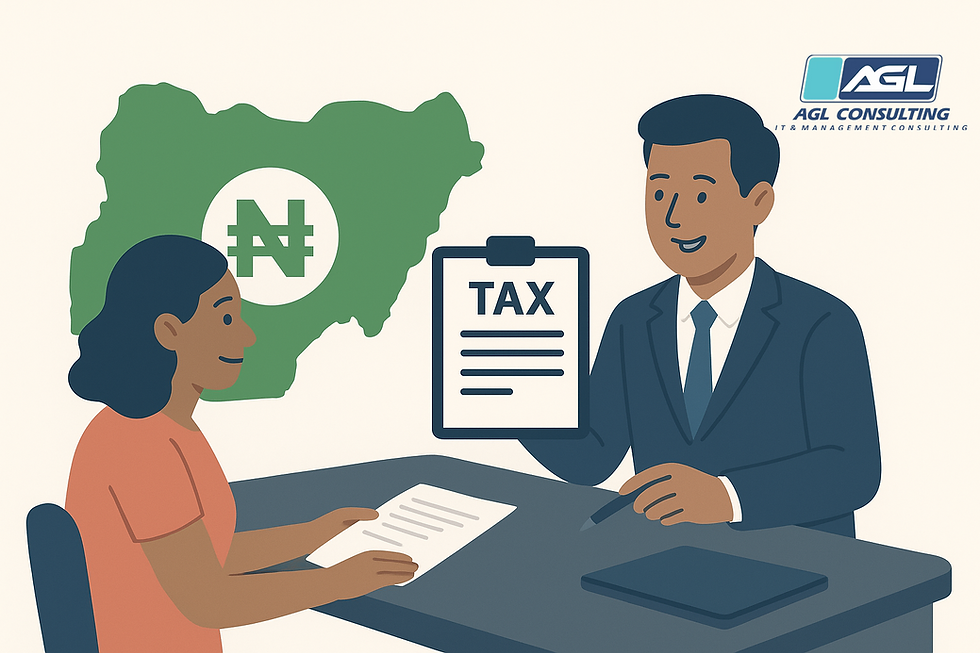Understanding Tax ID: Your Essential Guide from AGL Consulting
- Oct 21, 2025
- 4 min read

Frequently Asked Questions
Is Tax ID mandatory under the new law?
You've likely encountered these questions:
"Do I need a Tax ID under the new tax regulations?"
"If I have a TIN, do I need to get a Tax ID?"
"Why has the terminology changed?"
Let us clarify the essentials.
Tax ID and TIN: Understanding the Change
Under the Nigeria Tax Administration Act (2025), "Tax ID" has replaced "TIN" (Tax Identification Number). This is primarily a rebrand rather than an entirely new system. If you currently hold a TIN, that number now serves as your Tax ID.
Who Requires a Tax ID?
The requirement applies to "taxable persons," which includes:
Individuals earning income from trade, professional services, contracts, or business activities
Non-resident individuals providing taxable goods or services within Nigeria
Registered businesses and companies
Essentially, any entity whose activities generate taxable income requires a Tax ID. If you do not earn taxable income, this requirement may not currently apply to you.
The Rationale Behind the Change
Nigeria's previous identification system involved multiple reference numbers: federal and state tax IDs, CAC numbers, NIN, BVN, and others. The unified Tax ID system offers several advantages:
Simplified documentation processes
Elimination of duplicate identifiers
Enhanced tracking capabilities for tax authorities
This consolidation represents a modernization of the tax system rather than an additional burden.
How NIN and CAC Numbers Connect to Your Tax ID
For Individuals: Your National Identification Number (NIN) serves as the foundation. When registering for a Tax ID through a tax authority or when opening a business or income-generating bank account, the system retrieves your information from the National Identity Management Commission (NIMC) and generates your Tax ID, linking it permanently to your NIN.
For Businesses: Your Corporate Affairs Commission (CAC) registration number is the anchor point. Upon registering for a Tax ID, the system accesses your company's RC number and directors' information from CAC, establishing a permanent link to your Tax ID.
Important Note: Your NIN or CAC number itself is not your Tax ID. These identifiers are used to generate and permanently associate your Tax ID with you or your organization.
Do You Need a New Number?
In most cases, no. The new Act stipulates that existing valid TINs automatically become Tax IDs. Your action items:
Verify that your TIN remains active
Ensure proper linkage to your NIN (individuals) or CAC records (businesses)
Keep your Tax ID accessible, as financial institutions, government agencies, and business partners will increasingly request it from 2026
If you don't currently have a TIN but possess a NIN or CAC number, the system will automatically assign a Tax ID upon registration with the tax authority.
Additional Important Information
System Upgrades: Some tax authorities have begun modernizing their systems for tax reform compliance. In these instances, a new TIN may be automatically generated when you provide your NIN, even if you previously held a TIN.
New Business Registration: When registering a new business with CAC, your TIN will be issued automatically alongside your CAC number.
Automatic Registration: If you should have registered for a TIN but haven't, the tax authority may create one on your behalf and notify you within five days.
Multiple Tax IDs: If you inadvertently acquire more than one Tax ID, simply notify the tax authority. They will consolidate them into a single identifier.
Tax ID Requirements Across Sectors
Financial institutions will require Tax IDs from taxable persons for account operations. Beyond banking, your Tax ID must appear on:
Tax returns and filings
Official correspondence
Government contracts
Documentation for insurance and financial services
If you operate a business, engage in freelance work, or generate income through independent activities, we recommend addressing this requirement proactively.
Updating Your Information
Life and business circumstances change. The law requires updates to your Tax ID records within 30 days of any significant changes, including:
Business name modifications
Address changes
Marital status updates
Changes in business ownership
Maintaining current information ensures seamless compliance and prevents administrative complications.
Tax ID Suspension or Cancellation
Your Tax ID may be suspended or cancelled only under specific circumstances:
Suspension: Available if your business temporarily ceases operations; the Tax ID can be reactivated when you resume.
Deregistration: Applied when permanently closing a business.
Cancellation: Occurs upon the death of an individual or complete dissolution of a company.
Generally, your Tax ID remains valid throughout your lifetime or your business's existence.
Best Practices for Compliance
Current TIN holders: Verify proper linkage to your records
New registrants: Complete registration through official tax offices (this service is free)
Avoid unofficial channels: Register only through legitimate tax authorities to prevent fraud
Ensure consistency: Maintain uniform information across NIN, CAC, and tax documentation
Summary
The transition from TIN to Tax ID represents a modernization rather than a fundamental change. Existing TIN holders simply need to ensure proper linkage and keep their information current. Those without a TIN who earn taxable income should register promptly. The objective is a more efficient, unified tax identification system for Nigeria.
How AGL Consulting Can Support You
Navigating tax regulations doesn’t have to be complicated. AGL Consulting offers comprehensive support to individuals, SMEs, and corporations seeking clarity and compliance under the new Tax ID framework.
Our team provides:
Regulatory Guidance: Interpreting and implementing the latest tax and business compliance updates.
Business Advisory: Helping you align your accounting and ERP systems with current tax requirements.
Process Automation: Streamlining your tax reporting and registration processes through integrated digital solutions.
Ongoing Support: Ensuring your business remains compliant, efficient, and informed as regulations evolve.
Whether you’re updating your business profile or registering for the first time, AGL Consulting ensures a smooth transition to the new Tax ID system.
Let's handle your Tax Compliance professionally and efficiently.
























Comments